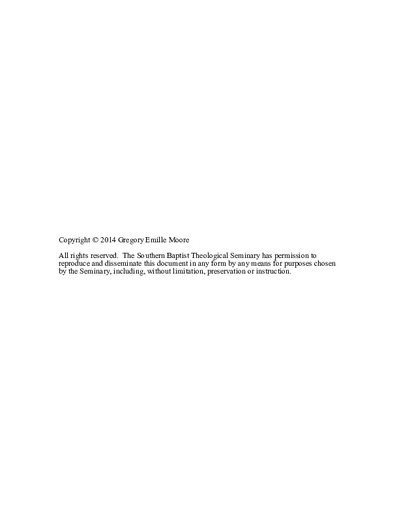Developing and Implementing a Discipleship Curriculum for Young Adult Men at Trinity Baptist Church in Fort Valley, Georgia
Abstract
ABSTRACT
DEVELOPING AND IMPLEMENTING A DISCIPLESHIP
CURRICULUM FOR YOUNG ADULT MEN AT
TRINITY BAPTIST CHURCH IN
FORT VALLEY, GEORGIA
Gregory Emille Moore, D.Min.
The Southern Baptist Theological Seminary, 2014
Faculty Supervisor: Dr. T. Vaughn Walker
Chapter 1 details the recruiting and enlistment of young men in the church for the project and the evaluation of their knowledge of discipleship. It details the strategy for developing a curriculum for a men's disciple ministry and discusses the present ministry context at Trinity. A brief history of Trinity's ministry to men is discussed to highlight the need for a men's discipleship ministry at the church.
Chapter 2 presents the biblical support and theological foundation for perpetuating the gospel ministry through discipleship. Commentary and supporting arguments are given from Matthew 28:18-20, Acts 2:41-42, Exodus 18:13-26, and 1 Timothy 2:2-4 that reveal the commonality that God's commandments are established in each generation through a form of discipleship.
Chapter 3 discusses the effectiveness of mentoring (the secular parallel to Christian discipleship) in secular society and what the church can glean from those successes. It highlights how entry level employees improve their skills and confidence as a result of mentoring by veteran staff. It stresses the importance of guiding mentees while they are in an actual work environment.
Chapter 4 describes the fifteen-week project in detail and specifically discusses what was done each week. It contains the methodologies used, such as surveys, pre- and post-test questionnaires, t-tests, the development of specific bible study topics, and an evaluation of the project by the project participants. A conclusion for the 15 weeks of activity is given.
Chapter 5 is an evaluation of the entire project to develop a discipleship curriculum for young men at Trinity Baptist Church. The project's purpose, goals, strengths, and weaknesses are discussed. There are suggestions for improvements for future reference along with theological and personal reflections about the entire project. The chapter concludes with findings and wisdom gained about developing a discipleship curriculum for young men at Trinity.

